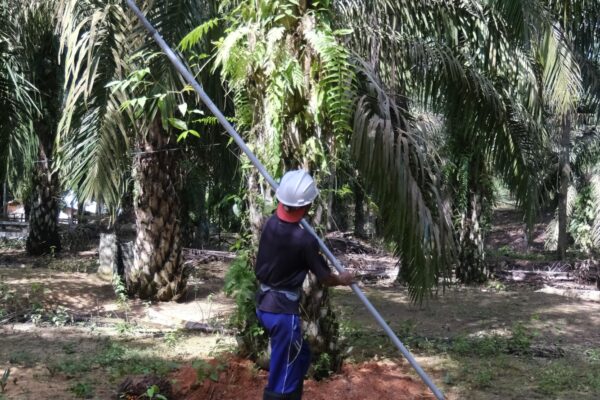4-minute read
The COVID-19 pandemic has disrupted supply chains and economies worldwide. In the first quarter of 2020, working hours fell by about 4.5 percent, compared to the previous quarter. This translates to roughly 130 million full-time jobs lost.
The pandemic has also impacted children; increasing risk of violence, exploitation, trafficking and child labour, often linked to poverty. A one-percentage-point increase in poverty can lead to a corresponding 0.7 increase in child labour, according to the International Labour Organisation (ILO).
In Sabah, Malaysia, there are between 40,000 to 60,000 Indonesian children living in oil palm plantations. The palm oil industry here relies heavily on migrant workers, whose children often live with them in remote areas with limited access to education, healthcare and birth registration.

On 9 August, Earthworm Foundation, with support from IOI Corporation and Nestlé, held a training session to help Malaysian palm oil refineries, mills and plantations strengthen child protection in their operations.
Sixteen upstream palm oil companies from Sabah and Sarawak, Malaysia – third-party suppliers to IOI – participated in the online session.
“It is very important that the palm oil we buy is responsibly-sourced and fulfils NDPE (No Deforestation, Peat and Exploitation) requirements.
Respecting child rights is critical for Nestlé and our responsible sourcing programmes. This is why we’ve been working with Earthworm and our palm oil suppliers on the topic for many years,” said Emily Kunen, Global Responsible Sourcing Lead for Palm Oil and Seafood at Nestlé.
Titled "Strengthening Child Protection in the Palm Oil Supply Chain," the main goal was to equip companies with a three-step process to develop interventions for children living on their sites. This includes ways to turn policies in actions, conduct a child-risk assessment and then develop a child-sensitive remediation mechanism.
The training also focused on crucial issues besides child labour, such as child sexual exploitation, violence, abuse, on-site safety, maternity protection, healthcare and nutrition.
“This is about working hand-in-hand with companies to take a forward-looking approach," said Lynda Lim, Malaysia lead for Earthworm's Children in Plantations work.
"Perspectives from people on the ground are crucial to developing locally-owned solutions," she said.

Lina Mah from Cepat Wawasan Group, an IOI supplier, presented initiatives to improve children's well-being on plantations in Sabah. She also shared the company's learnings and good practices in supporting children in plantations.
"I believe that children are like seedlings – we need to nurture them with proper food, shelter and clothing just like how we ensure our seedlings are bagged properly with sufficient water and sunlight. But if we apply fertiliser, we can enhance the growth of the seedlings, and that’s where education comes in for our children. Education is the enhancer that can shape a child’s foundation and provide them with more opportunities,” said Lina Mah.

In her closing remarks, Yeo Lee Nya, Sustainability and Responsible Sourcing Lead at IOI, explained the responsibilities of companies to ensure children are:

- free from child labour;
- safe at home and in plantation communities, and have decent living conditions;
- able to access schools and health services and are safe there;
- registered at birth;
- able to report abuse, sexual exploitation and violence, and have access to help;
- have safe spaces to gather and play.
--------------------
This training was conducted in support of Earthworm's Landscape and supply chain programmes in Malaysia, financially supported by Nestlé, and the ILO 2021 Action Pledge on Eliminating Child Labour.



